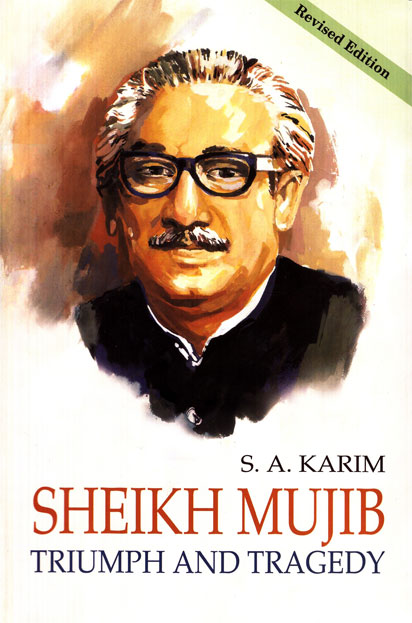- Shop
- Sheikh Mujib: Triumph and Tragedy
Sheikh Mujib: Triumph and Tragedy
https://uplbooks.com/shop/9789845061537-sheikh-mujib-triumph-and-tragedy-11868 https://uplbooks.com/web/image/product.template/11868/image_1920?unique=85d1384
| Language: English |
Tags :
Book Info
Writing an objective biography of Sheikh Mujibur Rahman, the only larger-than-life political figure of Muslim Bengal, is no easy task for a historian. In this well-researched book, Sayyid A. Karim has given a fascinating account of the life of Sheikh Mujib and makes an assessment of his legacy. Separating the man from the myth, the author has drawn a moving portrait of a heroic man who triumphed against all odds and became the founding father of a new nation, Bangladesh. While still young, Sheikh Mujib passionately supported the Pakistan movement, believing that the creation of a Muslim state was the best way of emancipating Bengali Muslims from the twin yokes of British rule and Hindu economic domination. But after Pakistan came into being, he passionately rejected the power centre in distant West Pakistan which showed an utter lack of interest in the well-being of Bengalis Muslims and Hindus alike. He became the foremost standard bearer of Bengali nationalism. For a while, shortly after the establishment of military rule under Ayub Khan, Sheikh Mujib even toyed with the idea of independence. The collapse of the Ayub regime ten years later gave him the glimmer of hope that revival of democracy in Pakistan was within reach. But when his party, the Awami League, won an absolute majority in the National Parliament, it soon became evident that the military had no intention of relinquishing power. Mujib was arrested, and the Pakistan Army resorted to a blood bath in a vain attempt to crush Bengali nationalism. After nine months of the liberation war, Sheikh Mujib returned to a free Bangladesh in early 1972 as its undisputed leader. Ill-advised, he adopted populist measures like nationalisation. The economy went into a downward spiral and famine was not long in coming. The 1974 famine had a profound effect on his psyche. Bangladesh had always filled his thoughts and he became convinced that a fundamental change of course was needed to surmount the crisis. He replaced the multi-party system by one-party state and concentrated power in his hands to implement what he called his second revolution. Machiavelli wrote: Nothing is more difficult to carry out, nor more doubtful of success, nor dangerous to handle, than a new order of things. Only a true revolutionary, with an iron will to take ruthless measures against anti-social elements and die-hard opponents of the new order could successfully carry out the far-reaching changes in government and society envisioned by Sheikh Mujib. Deep down he was a soft hearted man and did not have the ruthless streak in him to take strong action against counter revolutionary elements. He ignored warning signs of a conspiracy by disaffected army officers and thereby paved the way for the tragedy that befell him.

Sayyid A. Karim
Sayyid A. Karim (1928-2009) studied at the Universities of Calcutta and Dhaka, and at the London School of Economics. He became a member of the Pakistan Foreign Service in 1950. He was serving in New York as the Deputy Permanent Representative of Pakistan to the United Nations when the Bangladesh liberation war broke out. He left the Pakistan government service to join the liberation movement. Returning to Bangladesh after its liberation, he became the first Foreign Secretary. He also served for five years in the United Nations. He has traveled widely as a diplomat and an international civil servant.



